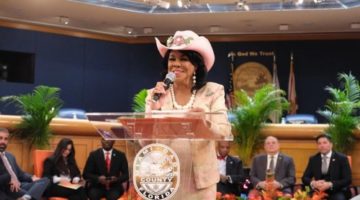
FORT LAUDERDALE _ Leola McCoy, a prominent environmental and civic activist who fought valiantly for years to clean up the old Wingate Superfund landfill site in Fort Lauderdale, died on Sunday at her home, according to her daughters, Verenda Daniel and Deatra McCoy. She was 70.
Services are scheduled for 10 a.m. Saturday, Aug. 23 at New Mount Olive Baptist Church, 400 NW 9th Avenue, Fort Lauderdale, with a viewing from 5 to 9 p.m. Friday, Aug. 22 at the Roy Mizell & Kurtz Funeral Home, 1305 NW 6th St. (Sistrunk Boulevard) in Fort Lauderdale.
Leola McCoy received an honorary law degree from the Shepard Broad Law Center at Nova Southeastern University, becoming the first person who was not a lawyer to receive such recognition.
McCoy also fought for cleanup and health studies in the neighborhood around Lincoln Park on Sistrunk Boulevard, where a former incinerator that sprayed ash around the neighborhood is located.
“My mom would not take a break from what she thought was important work,’’ Daniel said. “She literally sacrificed herself for the good of others.’’
Fort Lauderdale Mayor Jim Naugle agreed.
“She was very proud of getting her doctorate from Nova. And of course she served as one of my housing commissioners,'' Naugle said. "She was just a really dedicated leader and advisor to me. I hope the city and or the housing authority find some way to recognize her.’’
McCoy, a sixth-generation Floridian, began a lifetime career in community activism in 1963 when she got involved in voter registration drives.
“I began to understand that so many people had so many issues and could not find their voice. I felt that I needed to jump in and be supportive,” McCoy told the South Florida Times in a May 2007 interview. “I’ve been a busy granny.’’
Originally from Ocala, McCoy moved to Fort Lauderdale with her family in 1952. She graduated from Dillard High School in 1955. She and her husband, Douglas McCoy, were married for 46 years.
Douglas, who died in 2004 of prostate cancer, had two children before they were married, and together he and Leola had three children, all of whom have families of their own in south and central Florida. McCoy had 12 grandchildren.
“Mom had a very difficult childhood. She had to grow up very quickly and take responsibility for herself,’’ Daniel said, adding that McCoy left Ocala to live in Fort Lauderdale, where she ran a store and went to school. “Much of her childhood was lost.’’
Leola's husband gave her her first doll, Daniel said.
“She was so emotional when she received that,’’ Daniel said.
As a mother, McCoy was very playful with her children, enjoying popsicles and ice cream as much as they did.
“She would roller skate,’’ Daniel said. “She would chase us down the street, spotting us ten and kind of rolling us down. Then there’s the side of her that just carried the burdens of the world. Everything she saw on television just kind of affected her personally.’’
McCoy would help others in her neighborhood turn their lights back on; she would help others to keep from losing their homes, Daniel said.
One day, Daniel came home from college to find her bedroom empty of all its furniture.
“She said, ‘Somebody got burned out of their house,’’’ Daniel said.
After becoming the first black woman in the state elected as secretary to the chairman of the Broward County Democratic Party in 1968, McCoy eventually became disillusioned with the party, saying it only appealed to blacks when an election was coming up.
McCoy later sought public office on the Fort Lauderdale City Commission, running unsuccessfully five times to represent District 3, home to many of the city’s black residents.
“I thought in my heart that I could make a difference because I understood and I grew up here,” McCoy said in last year’s interview, adding that she never accepted corporate money during her campaigns, to maintain her independence. “I was involved on the ground with the people.’’
In 1984, during her first run for the city commission, McCoy came upon a cause that would make her an indelible community leader, elected or not.
She began to learn some alarming facts about the Wingate landfill, 1300 NW 31st Ave., where 480 tons of waste was collected every day between 1954 and 1978 then burned. The process resulted in a white ash that was visible everywhere in black neighborhoods in and around Fort Lauderdale, such as Roosevelt Gardens, Lake Aire and Golden Heights.
McCoy, who lived within one mile of the 60-acre landfill site for nearly 47 years, investigated the rise in rates of cancer, birth defects and still-born babies. She also devoted countless hours to educating herself on the effects of the chemicals and carcinogens the site produced.
“The more I began to understand, the madder I got,” McCoy told the South Florida Times last year, convinced that Wingate was to blame for her heart attack in 1999 and for countless other illnesses in the neighborhood. “I knew a lot of wrong had been done, and the people who had done it wouldn’t admit it. We have death lurking in the ground. It needs to be cleaned up.’’
Though a plastic liner has been installed above and around the contaminated soil, many chemicals still remain in the ground, McCoy said. While the site might be contained temporarily, McCoy feared possible repercussions after memories fade.
“The community needs to be made whole, and it is not whole as long as we have that threat,” she said. “Twenty years from now people will have forgotten the trauma and they will probably build some houses or something.”
McCoy said her biggest frustration was not with the city or the companies that dumped waste at the landfill, but with those she called “my people.’’
“This community has not done its part,” she said. “There were not enough boots on the ground.”
McCoy repeatedly said the community could do more to further its own interests if individuals would step up.
“We could garner a whole revival of new leadership; no one wants to be ‘that person,’ ” she said.
But for those who admired her relentless efforts to bring about change, McCoy was “that person.”
In 2002, she received the Thurgood Marshall Advocacy Award from the Urban League of Broward County. She shared the honor with Sharon Bourassa, an attorney for Legal Aid Service of Broward County who joined her in the Wingate clean-up fight.
“She worked tirelessly to the bone and she worked for nothing,’’ Bourassa said on Monday. “I looked to her as a sister. She could not be bought off. If there was anyone that could not be bought off, it was her. She hated seeing the injustices done to the people and she always stood for truth. It is a tragedy for the black, white and Hispanic communities as she represented all people. Like Mother Theresa stood above the crowd, she stood above the crowd.”
McCoy was known for speaking truth to power.
“She’s just very, very honest,’’ Daniel said. “Either you loved her or you hated her. And there was never any middle ground with her. I admired her candor.’’
McCoy nurtured her spirit of community activism much in the way some people develop a vocation. Her house is filled with files and records, some packed into boxes and some in free-standing piles, representing the numerous community endeavors that defined McCoy’s life.
Though she did not graduate from Nova Southeastern University, where she did some initial coursework, the university awarded her an honorary doctor of law degree.
One of her last endeavors was the cleanup effort at Sunland Park Elementary, which more than 500 students attended each year. The school, 919 NW 13th Ter., was found to have several serious health concerns, including chronic mold problem and the potentially contaminated water in its sprinklers, according to officials.
In March 2007, McCoy brought her community experience and accumulated knowledge about environmental hazards to assist in the investigation.
Calling the Sunland Park problem a “huge environmental threat,” McCoy said at the time that she was taking the situation seriously.
“We want this operation to be as transparent as possible,” she said, “even if we have to go around with Windex spraying the windows.”
Matt Dingerdissen, formerly of the University of Miami News Service, Elgin Jones and Shanique Palmer contributed to this report.
Pictured above is Leola McCoy.












No Comment